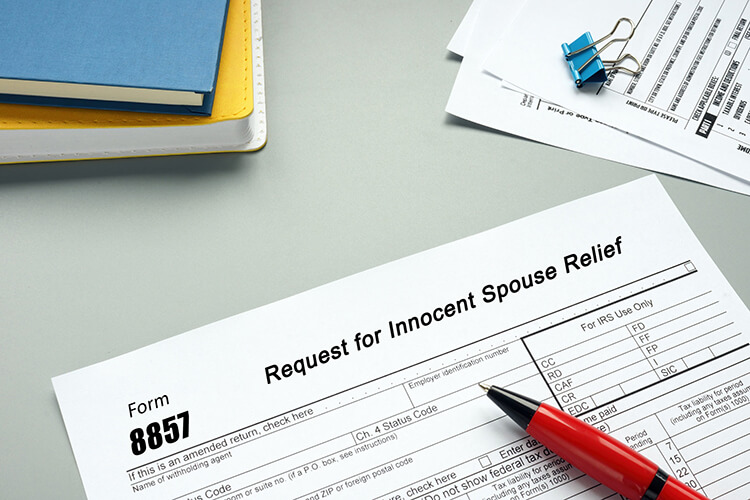Tax Relief for Innocent Spouses

There are three types of tax relief for innocent spouses: Innocent Spouse Relief, Separation of Liability, and Equitable Relief.
Innocent Spouse Relief. Under this provision, you can request relief of responsibility for paying tax, interest, and penalties if your spouse (or former spouse) improperly reported items or omitted items on your tax return.
Separation of Liability. If you are divorced, widowed, legally separated, or not living together for at least 12 months, this provision covers you. Under this tax relief, you allocate (divide) the understatement of tax (plus interest and penalties) on your joint return between you and your spouse (or former spouse).
Equitable Relief. Under this provision, if you do not qualify for Innocent Spouse Relief or Separation of Liability, you may still be relieved of responsibility for tax, interest, and penalties through Equitable Relief. You can get equitable relief from an understated tax or an unpaid tax. An unpaid tax is an amount of tax you properly reported on your return but have not paid.
Each type of tax relief has different requirements, and you must meet all the conditions to qualify.
Know the Following Before Filing Form 8857
Note that the IRS must contact your spouse or former spouse, no exceptions, even for victims of spousal abuse or domestic violence. To protect your privacy, the IRS will not disclose your personal information (such as your current name, address, phone number(s), or information about your employer, your income, or your assets.
If you petition the US Tax Court to review the IRS final determination on your petition, you will need to ask the Tax Court to withhold your personal information.
How to Request Tax Relief for Innocent Spouses
To request tax relief for innocent spouses, file Form 8857, Request for Innocent Spouse Relief. The IRS will figure the tax you are responsible for after you file Form 8857. You are not required to figure out this amount, but if you wish to, see Publication 971.
Injured Spouse Relief is Not Covered Under Innocent Spouse Relief
Injured Spouse Relief is not covered under Publication 971. For information on Injured Spouse Relief, see Form 8379, Injured Spouse Allocation.
When to File Form 8857
You should file Form 8857 as soon as you become aware of a tax liability for which you believe only your spouse or former spouse should be held responsible.
You must file Form 8857 no later than 2 years after the date the IRS first attempted to collect the tax from you.
Where to File Your Form 8857, Request for Innocent Spouse Relief
You may mail Form 8857, Request for Innocent Spouse Relief, to:
Internal Revenue Service
PO Box 120053
Covington, KY 41012
Or
Fax your Form 8857 and attachments to the IRS at 855-233-8558. Please write your name and social security number on any attachments.
Note: Please do not file Form 8857 with your tax return or the US Tax Court.
How Rockwater Associates Can Help
Rockwater Associates can help answer your questions about Tax Relief for Innocent Spouses, including topics on:
- How to Request Relief
- Innocent Spouse Relief
- Separation of Liability
- Equitable Relief
- Erroneous Items (Unreported Income, Incorrect Deduction, Credit, or Basis)
- Community Property Laws
- Refunds
- Final IRS Determination
- US Tax Court Review of Final IRS Determination
We can also help you with Filing Form 857.
Contact Us
Let a trusted partner like Rockwater Associates help you. We provide the expertise and experience to help you navigate simple and complex tax issues.
